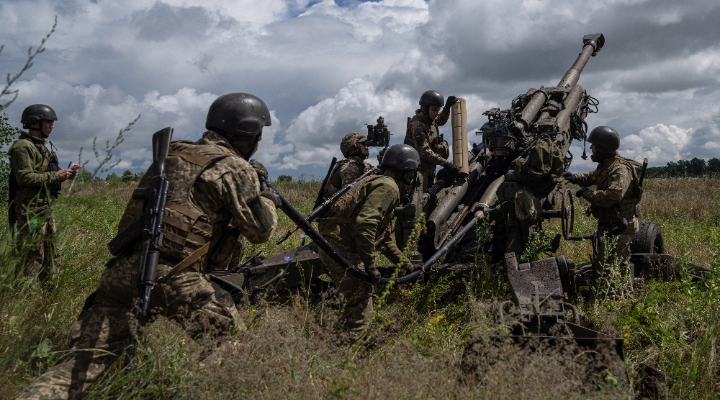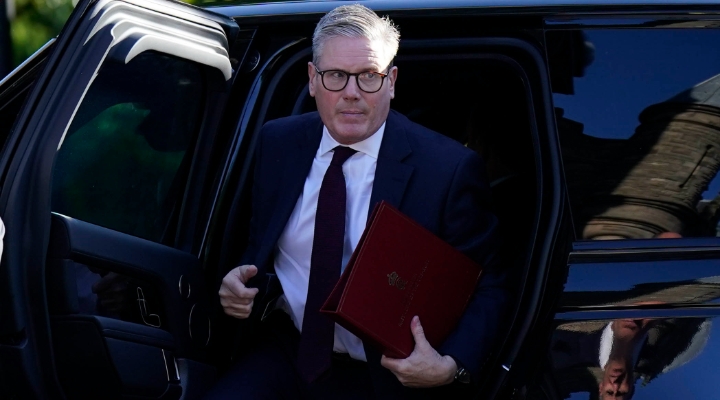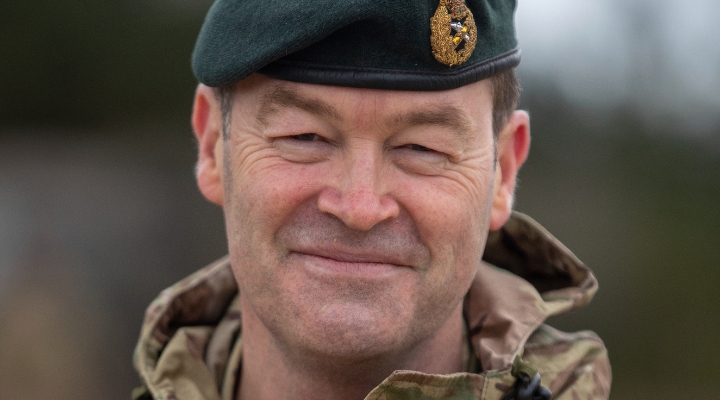
In an interview broadcast last week, the chief of the general staff (CGS) sounded upbeat.
"The British Army will be the most modern and the most lethal army in Europe by the end of this decade," General Sir Patrick Sanders (pictured above) claimed.
As conflict burns on NATO's borders and Putin meets Kim Jong Un to discuss arms deals, these are not the words of a man overcome with worry. But nor are they the sentiments of a general about to leave. And yet he is indeed on his way out, and early.
To some this is a huge disappointment. Sanders stamped his authority on the role very quickly in June last year when he banned a battalion of airborne troops from serving in Kosovo over an explicit online video. But some would say he's also got a sensitive side.
In his previous role, he had spoken openly about his struggles with depression, and encouraged colleagues of all ranks to discuss their struggles openly. It's a message he repeated last week, when he said struggling service personnel should "take the risk" of talking to someone.
Talk of mental health is not theoretical at the top of the MOD. Several weeks ago, an extremely senior Royal Air Force (RAF) officer published what appeared to be a suicide note online. He was thankfully found alive in the aftermath, but it led to an almighty debate about what constitutes good mental health policy in the military.
Sanders has also made failure part of his brand. Discussing his experience of Sandhurst, where the British Army trains its junior officers, he describes getting thrown out of university during an Army cadetship for "a combination of not working hard enough and misbehaviour."
"I failed on every level, but I was lucky. I failed quite hard, quite early on," he said.
"At Sandhurst I accumulated what must have been the worst disciplinary record of any officer cadet in history - about 40 days of restrictions of privileges."
And yet in June reports showed he was quitting after just a year in post as the professional head of the British Army. Why is such an experienced officer – who has very publicly displayed an entirely humane style of leadership unfamiliar to some of those below him – suddenly throwing in the towel?
Normally a CGS serves three years, unless they are promoted to chief of the defence staff (CDS), the most senior British military officer. In this case, Sanders was on a two-year contract, apparently at the behest of now-former Defence Secretary Ben Wallace.
Typically the CDS role rotates between officers from the Army, Royal Air Force (RAF), and Royal Navy. While that promotes inter-service co-operation, it also produces very different interpretations of military priorities. Is one solution to this keeping defence chiefs on a tighter leash? We won't know until Wallace publishes his memoirs, if he ever does. Or if Sanders publishes his.
Bitter Rivalries
It's not clear who came up with the analogy, but one of the best descriptions of the "teamwork" that goes on in the Ministry of Defence (MOD) comes from sport.
The Army, it is said, is like a rugby team. Muscular and aggressive, it derives a certain amount of pride from running around the field with a bloody nose, and certain of its units care less about sartorial decorum than others. Overall, it is a resilient, physically rigorous, but occasionally rogue warfighting organisation.
The Navy is a bit like a huge rowing team. Used to pulling in the same direction, its crews operate in cramped conditions for long periods, often a long way from home. A service in which loneliness is underacknowledged, the Royal Navy's sailors are born in Carlisle and made in an organisation that is mathematically minded yet steeped in seafaring legend.
Unlike the Army, it is often bearded, as sailors don't spend as much time wearing respirators. The Army still largely bans beards to ensure effective respirator use.
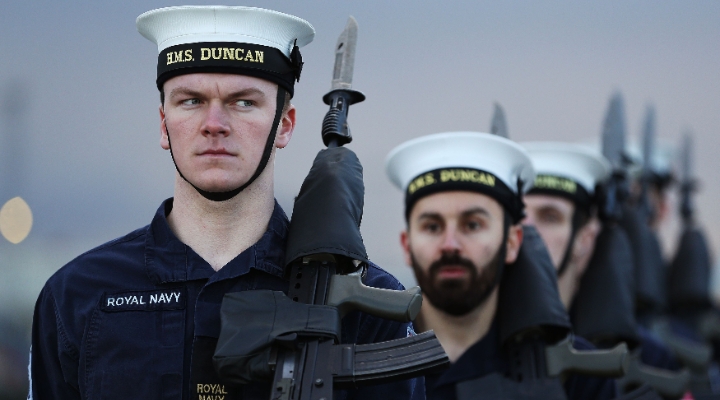
Beard ban: unlike the Navy, the British Army bans beards, with exemptions only available for religious or operational reasons. Soldiers in "traditional" ceremonial roles may grow them
The RAF, meanwhile, may be likened to a Formula 1 team, in which lots of people focus all their energy on making a small number of people go extremely fast without getting killed.
Unlike the Army’s own flying outfit – The Army Air Corps – all of the RAF’s pilots are officers, so the majority of airmen will never be badged pilots. Its own force protection unit, an infantry group known as the RAF Regiment, is the butt of many an Army joke, yet sends more candidates than you would think to SAS selection each year.
These differences yield more than just jokes, however.
Through good humour, harsher "banter", and unresolved class tension, each service ritually reminds its personnel they are better than their counterparts. At times this is vital. At others, destructive. Sometimes it's just smug. With not a hint of condescension to the Army, a former RAF officer once said: "dig in or check in, choose your service wisely."
It so happens the current CDS – the head of the armed forces – Admiral Sir Tony Radakin, is a sailor.
Rumours abound of tensions between Sanders and Radakin over army cuts, though Radakin has since publicly dispelled the suggestion he quarrelled with the CGS as "nonsense". The decision to limit Sanders to a two-year posting was Wallace's decision, he said, and happened before Radakin had even taken over at the top of the armed forces in 2021.
Tension or no, however, Sanders can perhaps be forgiven for focusing on the here and now, and on cuts imposed by Whitehall, amid accusations by the US that the British military is no longer a "tier one" force capable of deploying a fighting division at short notice.
To be clear, that doesn't just mean fighting troops.
The MOD's capabilities are internally divided into categories, and the logistical one is arguably the most important. It's known colloquially as "G4", and the phrase "G4 wins the war" is a popular one anyone without a loyalty to the infantry.
Though it is itself the butt of jokes about being the "rejects' last chance", the Royal Logistic Corps (RLC) is an essential component to the mix. Got troops? Where are your trucks? Got tanks? Where are your low-loaders? Got food and ammunition? Where are your drivers for the logistic patrols? Less glamorously, someone needs to refuel just about every vehicle with wheels or tracks.
For Sanders, these constraints are compounded by Ukraine. His service is the one spending the most amount of time on the conflict. British troops are not "deployed" per se, but they have been training Ukrainian units for years, and more recently arranging the supply of ammunition, Challenger 2 tanks, armoured personnel carriers, AS90 self-propelled guns, and, in the earlier stages of the war, Javelin and NLAW anti-tank weapons. Like other army units, they've also been propping up the public sector during coronavirus and strike action.
All of that is a headache for G4.
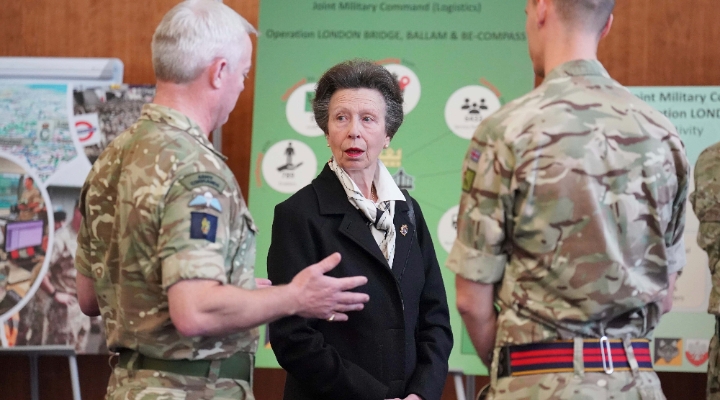
G4 wins wars: born of the merger of five British Army corps in 1993 and identified by its red, blue and yellow belts, the Royal Logistic Corps (RLC) is one of the UK's largest military units and delivers everything from bomb disposal to ports and maritime vehicle transfer
But the military is not just the army.
Neglected for too long during the War on Terror, the Royal Navy has only just regained its two-aircraft-carrier status, but even that is a fragile status quo. The too-ing and fro-ing over whether it would host vertical take-off and landing aircraft was painful. The projects completed eventually. Then the trouble began.
Earlier this year, HMS Prince of Wales had to return to port with a broken propeller shaft shortly before participating in a US-led exercise. Parts from the ship are reportedly being cannibalised to keep flagship HMS Queen Elizabeth operational.
Senior Naval officers may describe the carriers as a pyrrhic victory, then, and a project that cannot afford to be neglected. If a central pillar of military doctrine is you cannot control land without controlling the sky, you cannot do either a long way from home and at short notice without aircraft carriers. And they must not sail alone. Destroyers and frigates must go too to protect them, alongside minesweepers and cruisers.
And then there are aircraft. During the Falklands conflict, Britain's carrier air power was primarily provided by the Navy's Fleet Air Arm Harriers, but the RAF did contribute its own Harriers. A petty falling out ensued over which colour of paint to use on the planes. Today's carriers accommodate the next-generation F35 fighter, but it's not been all plain sailing, particularly after one of the £88 million aircraft plunged into the sea.
And then there's Britain's nuclear arsenal, which is managed underwater by Royal Navy officers who have survived the Submarine Service's notorious "punisher" course. Getting the whole lot to work together requires serious teamwork. It also requires the (classified) technology to work. There is more to MOD than just a green rugby jersey, then.
No Home and Away
Whether you're a Radakinite or a Sandersite, however, matters little. Conflict never sleeps. The War on Terror era is over, and the days of insurgents clocking off at lunch in the poppy fields of Gereshk are over. Time is of the essence.
"There is no longer the luxury of thinking about operations as home and away – it’s a single continuum," General Sir Jim Hockenhull, the British Army’s commander of strategic command, said last week at DSEI, the global defence equipment exhibition.
"Future military operations will almost certainly involve combat, and we will ask remarkable people to do remarkable things. We need to be better prepared to help deter these adversaries from using force to realise their ends."
Hockenhull is clear on one further thing. No doubt subtly acknowledging the perennial issue of the British Army’s shrinking headcount, the MOD cannot do it alone. It employs over 142,000 military personnel, of which more than 77,000 are regular army soldiers across various disciplines. But those numbers are set to fall yet again – apparently to Sanders' chagrin (and his predecessor: general Sir Mark Carlton-Smith).
To that end, it needs "partnerships". The obvious and convenient ones require allies, of which the UK still has many. But words and handshakes are cheap. The more complicated (and expensive) relationships require contractors, exercises, and ammunition, a lot of which MOD has given away.
Having enjoyed a relative period of military familiarity in the form of defence secretary Ben Wallace, the MOD is now in flux. The new defence secretary, Grant Schapps, a man who once faced the ire of the press for saying he had "over-firmly denied the truth" about his second job, is but days in role. And there is an election next year.
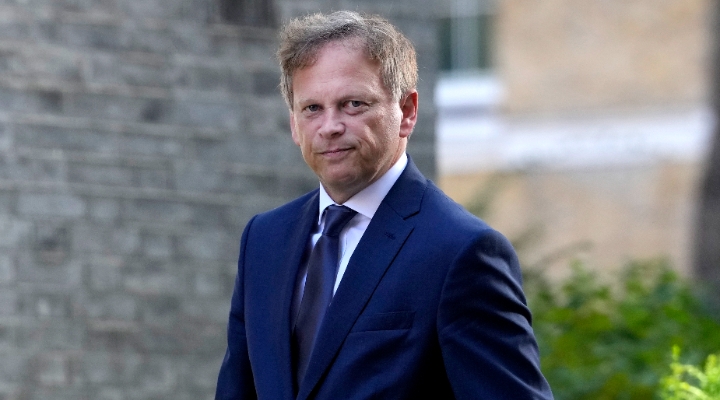
Defence grants: once known by the business alias Michael Green, Grant Schapps became an MP in 2005. A cousin to Mick Jones from The Clash, he has had more than a few brushes with controversy before and since
There will also be a new CGS when Sanders departs. Lieutenant General Sir Charles "Roly" Walker continues an emerging tradition of placing special forces veterans at the top of the MOD, but it's difficult to tell whether this approach will pay off in an era of meat grinding in trenches and cyber-hacking.
As Putin and Zelenskyy have both discovered, you need a terrific number of people, machines, and artillery shells to hold ground. It is a lesson the British Expeditionary Force learned a very long time ago during the shell crisis of 1915. Over a century later, the MOD is once more in learning mode.
One lesson is that it takes time to build relationships. That didn't take long with Wallace, who was already well-versed in MOD matters from his time in the military. It could take longer with Schapps, though Radakin has diplomatically stated he is glad MOD has a secretary of state with no military experience. But that might be the easy bit.
This much Hockenhull knows, and he put it eloquently enough last week at DSEI.
"We must not wait for conflict to build those relationships. You cannot surge trust," he says.








.jpg)
.jpg)
